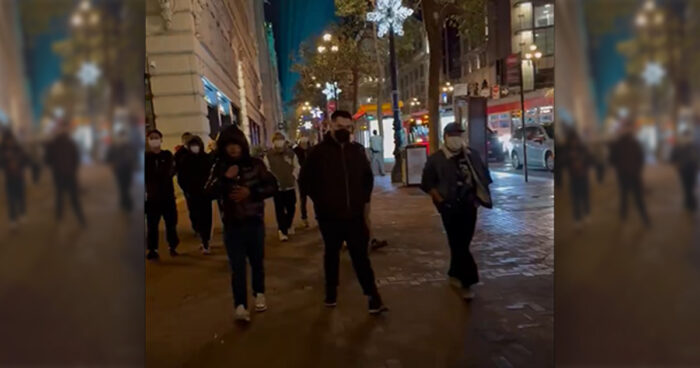
The US Congress members chairing the Congressional-Executive Commission on China are condemning violent attacks by pro-China demonstrators against Tibetans and others who protested Chinese leader Xi Jinping’s visit this month to the United States.
Rep. Chris Smith, R-NJ, and Sen. Jeff Merkley, D-Ore., chair and co-chair of the commission, said in a statement this week: “We are outraged by videos showing harassment and assault against human rights advocates who gathered in San Francisco last week to protest [Chinese Communist Party] General Secretary Xi Jinping’s visit to the United States and ongoing human rights abuses by the People’s Republic of China. The constitutionally protected right to peacefully protest must be respected, and law enforcement must step in where peaceful protestors are met with violence.”
Xi, China’s president for life, visited San Francisco Nov. 14-17 for the Asia Pacific Economic Cooperation summit. During his time in the US, he met with President Joe Biden, the leaders of other countries and top business executives.
Xi’s visit also drew massive protests by groups demanding an end to China’s human rights violations and assault on basic freedoms.
Violent attacks
Smith and Merkley’s statement notes that, “Crowds of Hong Kongers, Uyghurs, Tibetans, and other advocacy groups gathered in San Francisco to peacefully demonstrate against Xi’s participation at the APEC summit due to China’s horrendous human rights record. Many reported being attacked by pro-CCP counter-protestors.”
The statement continues: “A group of Tibetan youth activists claimed they were assaulted and had their banners stolen by pro-CCP demonstrators wearing masks, while Tibetan advocate Chemi Lhamo said she was surrounded and harassed for nearly 15 minutes and subjected to hair pulling, physical assault, and the stealing of her cell phone, which was tossed into nearby water, presumably because it contained evidence identifying her assailants.”
According to at least one human rights group, the assailants may have ties to China’s consulate, which Smith and Merkley say raises “concerns of official Chinese support for these attacks.
“We, the Chairs of the CECC, strongly condemn the reported violence perpetrated against individuals exercising their rights of freedom of expression and assembly in the United States,” they say. “We urge San Francisco County police to review these reports and pursue justice as appropriate.”
The CECC has documented the long arm of China’s harassment of dissidents and Chinese diaspora members in the US and elsewhere. Earlier this year, the commission held a hearing on “Countering China’s Global Transnational Repression Campaign.”
Xi’s visit
Xi met with Biden near San Francisco on Nov. 15. According to the White House, Biden raised with Xi “concerns regarding [People’s Republic of China] human rights abuses, including in Xinjiang, Tibet, and Hong Kong.”
The International Campaign for Tibet welcomed this news but said “more needs to be done. Tibetans, Uyghurs and many other groups, including the Chinese people themselves, have been denied the freedom to raise their grievances and seek redress from the Chinese government. Xi and his officials must hear their voices too, and the Biden administration has an opportunity to push them to listen.”
In particular, ICT said, Biden should press Beijing to return to direct dialogue with the representatives of the Tibetan people, as he promised to during his 2020 campaign.
China has brutally occupied Tibet for over 60 years, turning it into the least-free country on Earth alongside South Sudan and Syria, according to the watchdog group Freedom House.
ICT also condemned the reported violence against protestors, saying: “China brutally denies Tibetans the right to protest inside Tibet. It is crucial that Tibetan Americans and Tibet supporters in the United States be able to speak up for their just cause without fear of violence and harassment.
“The Chinese government and its operatives must not be allowed to intimidate or assault Tibetans on American soil.”

